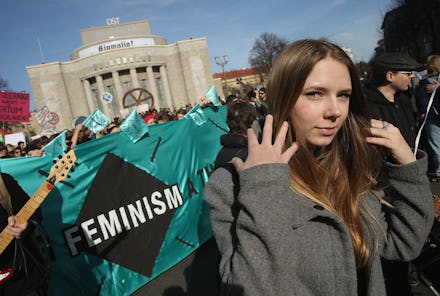One Depressing Number Shows Why We Still Need International Women's Day

Zero.
That's the number of countries that have achieved full gender equality, according to the United Nations' top official working on international women's rights.
In a recent interview with the Associated Press, Phumzile Mlambo-Ngcuka, the United Nations Under-Secretary-General and executive director of U.N. Women, noted that there are fewer than 20 female heads of state, that just 22% of legislatures are female and that not a single country has reached full gender parity.
At the current rate of progress, Mlambo-Ngcuka told the Associated Press, the average woman born today will be 81 before she has as equal odds as a man to become CEO of a company, and she'll be 50 by the time the gender gap in heads of state becomes part of the past.
"Instead of becoming a norm ... there has been resistance to those rights — deadly resistance as we have seen now in the Middle East," she said, according to the Associated Press. Ever since the 1995 U.N. conference on women's rights in Beijing, Mlambo-Ngcuka said, "the sheer scale of the use of rape that we've seen post-Beijing ... I think tells us that the women's bodies are viewed not as something to respect, but as something that men have the right to control and to abuse."
In a separate statement posted on the U.N.'s website, Mlambo-Ngcuka added, "Not one single country has achieved equality. It is even more urgent than ever that we define — and stick to — a time frame [for doing so]."
"In Africa, 70% of crop production depends on women yet women still own only 2% of the land," she said in the statement. "Women need change and humanity needs change. This we can do together; women and girls, men and boys, young and old, rich and poor."
This is why International Women's Day is important. No one can plausibly argue that women don't still have a long way to go to defeat international sexism when not a single country has completely defeated gender gaps in things like pay, leadership positions or education. (Not even the Nordic countries, with the exception of Denmark, have managed to close 80% of the gender pay gap.)
In the United States, where the genders have made tremendous progress since the 1960s, the New York Times noted in 2013 women are "still paid less at every educational level and in every job category. They are less likely than men to hold jobs that offer flexibility or family-friendly benefits. When they become mothers, they face more scrutiny and prejudice on the job than fathers do."
According to the nonprofit of the same name that organizes International Women's Day, since its inception in 1908, the day has become a recognized holiday in 27 countries and is now so big that "thousands of events are held throughout the world to inspire women and celebrate achievements. A global web of rich and diverse local activity connects women from all around the world ranging from political rallies, business conferences, government activities and networking events through to local women's craft markets, theatric performances, fashion parades and more."
"Today, you are marching in the footsteps of generations of feminists," New York's first lady Chirlane McCray told a gathering of 1,000 people at U.N. headquarters, according to the Associated Press. "This march started more than a century ago, but we still have a long way to go before we get to equality."
This kind of solidarity for women is exceptionally important. The key strength that enabled women in many countries to make social progress in the last century has been their ability to work together and build movements for change. As actress Emma Watson recently said in a live Q&A session on Facebook, "We're never, ever, ever going to be able to fly as high unless we're both in support of each other."
"It's not about men saving women, and I think that's a misunderstanding," Watson said. "Women are already in the club. We're already in the club because it's our movement. It's not a men's club. It's an equality club for both genders."
"If you stand for equality, then you're a feminist," said Watson. "Sorry to tell you, you're a feminist."